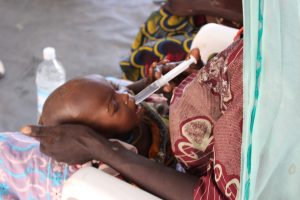Lives disrupted globally and locally
When the murder of George Floyd on Memorial Day ignited a new wave of Black Lives Matter protests in Minneapolis, across the U.S. and around the globe, young Nigerians connected the cause to police brutality in their own country, and held high the names of Alex Ogbu, Tina Ezekwe and others, alongside those of George Floyd and American victims.
Related Posts
On Oct. 3, another police killing of an unarmed civilian – this time in Lagos, the largest city in Nigeria – was recorded on video and quickly went viral. Demonstrations calling on the government to #EndSARS (the Special Anti-Robbery Squad, notorious for harassment, abuse and extrajudicial killings of civilians) spread massively, but were met with violence by police, security forces and most recently military troops. It’s been reported that at least 69 people have died since Oct. 7, including at least 10 who were killed Oct. 20 when army soldiers fired on protesters at Lekki Toll Gate in Lagos.
Cities and towns around the West African country have been swept up in the demonstrations and impacted by the chaotic aftermath of the government crackdown, which has included torching of government facilities and private property, looting of hospitals, pharmacies, warehouses containing food relief and more, and jailbreaks. Leaders around the world have condemned the Nigerian government’s violent response to demonstrators, calling for justice and a peaceful resolution of the issues brought to light by the #EndSARS protest movement.
A country in desperation
These events have taken place against a backdrop of deteriorating conditions in Nigeria, where for years civilians have borne the brunt of widespread violence due to religious, political and economic strife. The United Nations Office for the Coordination of Humanitarian Affairs (UN OCHA) describes a country in which 1.9 million people have been forced to flee their homes in search of safety from armed insurgents and vigilantes. These internally displaced people cannot return to their homes. There is food insecurity, with millions of children facing malnutrition, and relief agencies lack access to people who need help due to the civil conflicts and many other tragic situations. The COVID-19 pandemic has made conditions much worse; since its onset, the number of people in northeast Nigeria in need of humanitarian aid has risen from 7.9 million to 10.6 million, 80 percent of whom are women and children.
It’s personal for our students

In the chaos last weekend, a psychiatric hospital in southern Nigeria was invaded and its pharmacy was ransacked and looted.
I do not have answers here, but the fear and chaos of recent weeks hit home for me when I heard about the ways in which this situation is affecting some of our students. Eight students enrolled at Gillings this semester are from Nigeria. Indeed, one of our students shared photos and videos from her hometown, which has endured terrifying levels of disruption, vandalism and violence. We empathize with our students who have been impacted and with all Nigerians who are living with lockdowns, curfews and ongoing tension in the aftermath of devastating violence and governmental oppression and denial. We have heard that things are calming down gradually.
In my role as dean, I have been struck repeatedly by the recognition that most of us live our days in regular ways while some among us are bearing incredibly deep suffering. We should take a moment to contemplate what it might be like to be students in these circumstances and consider what we can do when we witness grave violations of human rights and gross injustice in the world.
To our Nigerian students: We support you and your families. We are deeply troubled by what is happening in Nigeria. Let us know how we can help. We encourage people at Gillings to contribute to reputable aid organizations. To our faculty and staff members: Please reach out to your students from Nigeria, and please be as flexible as possible with assignments and due dates. These students need and deserve our support. To all our international students, we know some of you or your families are living through circumstances that are as traumatizing as those described here. Our hearts are with you. To all of us, another reminder: We do not always know the stress and pain endured by people surrounding us, including our students. Let us continue to make space, in and out of class, for students, staff and faculty members to share the challenges they are facing.
Barbara
Acknowledgement: I am grateful to Elizabeth French and Lisa Warren for their contributions to this post and to our students who have reached out to share their experiences during this extremely difficult time.
Banner photo credit: TobiJamesCandids, CC BY-SA 4.0, via Wikimedia Commons
Comments
nigeria is a beautiful place. I would love to go once in my life. I watch nigeria in documentaries and it interests me a lot.
Burdai corki
I visited Nigeria last year in May. I couldn't believe what I see there. Very poor people. I was very sad what I see there. I wanted to help, and did for some of those. But not enough. I am from Turkey and a student. I did what I can do.



mersin vestel servisi